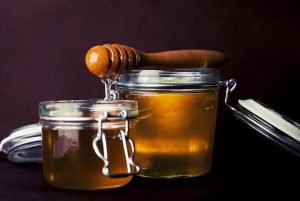More and more people are choosing to use honey instead of sugar. For example, honey is processed in dishes, mixed in protein shakes, and gives lean cottage cheese a sweeter taste. It is often thought that honey is healthier than sugar. Even medicinal and anti-inflammatory (side) effects are attributed to But to what extent is this true? I have listed all the characteristics of this sweet substance to discover to what extent honey is a healthy choice. In this way, I hope to tell you whether honey is good for health, whether this thought is based primarily on nutritional hype.
What is honey?

Before we start looking at honey’s effects on our health first a little more about what honey is exactly, honey is a sweet substance, which is naturally liquid, which arises from the nectar of flowers. Honeybees collect this nectar, and the addition of enzymes converts it to honey.
We use honey mainly as food. The colour and taste of honey depend on the origin of the nectar. In other words; the honey of one flower tastes different from the honey of other flowers. Also, the taste is partly determined by the degree of crystallization.
Nutritional values honey
To determine whether honey is healthy, we first take a look at the nutritional values. What exactly is in honey and in what quantities? Below you can see the macronutrients of honey per 100 grams.
- Energy: 304 kcal
- Protein: 0.3 grams
- Carbohydrates: 82 grams (of which 82 grams of sugars)
- Fats: 0 grams
- Fibre: 0.2 grams
Also, honey contains 4 mg sodium and 52 mg potassium. There are also some vitamins & minerals in honey, namely 6 mg calcium, 0.5 mg vitamin C, 0.4 mg iron and 2 mg magnesium (per 100 grams). As you can see, honey consists mainly of sugar, which explains the sweet taste.
Effect of honey on our health?

Honey lovers often claim that the honey is healthy due to certain medicinal effects. For example, it would have an anti-inflammatory effect and contain many antioxidants and probiotics. For this blog, I’ve figured out how much of this is true here.
Anti-inflammatory action
Of course, the most important thing is that honey tastes good, but did you know it’s a natural antibiotic? This is due to certain enzymes of the bees that end up in the honey during the conversion of nectar to honey. These enzymes ward off bacteria and fungi. For example, drinking hot tea with honey can help with strep throat.
But also, stomach ulcers and intestinal infections can be reduced by the action of honey. Pay attention; the action of the enzymes weakens when you heat the honey.
Protection against free radicals
Other ingredients that would make honey healthy are the antioxidants that protect your body from free radicals. Free radicals are a type of waste in our bodies the size of atoms.
These free radicals can attach themselves to other cells and thus cause a disturbance in the cell’s process. Antioxidants neutralize these free radicals, thus reducing the disruption of physiological processes [2].
But honey is just sugar.
True! Honey consists of about 80% fructose and glucose (hence 82 grams of sugars per 100 grams of honey). Granulated sugar also consists of a combination of glucose and fructose. So when you look purely at the carbohydrates in foods like granulated sugar, cane sugar and honey, there is no difference.
The sugars in these products are quickly absorbed by your body and cause a rapid rise in your blood sugar levels. You get energy quickly, but this peak is also decreasing quickly. As a result, your blood sugar level drops, and you experience a dip. Given its chemical structure, there is little difference between honey or sugar.
Glycemic index honey
Although sugar and honey are very similar, there is a small difference. The glycemic index of honey is slightly lower than that of pure sugar. Honey has a GI of 70, while granulated sugar has a GI of 100.
This is because honey is not just made of sugars. About 82% is fructose and glucose, but the rest consists of water (and a little bit of protein and micronutrients). However, this does not mean that the glycemic charge of honey is low. A GI of 70 is still well above 50. And a GI below 50 is only considered low.
Choose raw and organic honey.
Honey, therefore, has more ingredients with an added value for our health than sugar. Unfortunately, there are several points to consider. The first ‘problem’ is that pesticides are used in the production of honey. These drugs are used to protect the bees from, for example, mites.
The substances that the honey bees ingest end up in the honey. And when you put a dash of honey through your tea or cottage cheese, you also get these pesticides, antibiotics or virus inhibitors. In tiny quantities of course, but I still don’t like this idea!
Also, beekeepers who want to make a lot of money often use sugar water as food for their bees. Normally, honeybees feed by eating some of their own honey. This is taken away by the beekeeper and replaced by sugar water, which does NOT contain the good nutrients described above.
Therefore, the honey that these bees produce will also contain less of the important enzymes, antioxidants, and vitamins and minerals. Therefore, it is important to opt for raw and organic honey.
So is honey healthy?
As you have read in this article, there are a few properties that can make honey healthy. For example, it contains several vitamins and minerals, contains antioxidants and has (partly because of this) an anti-inflammatory effect.
The glycemic index is slightly lower than that of table sugar, but sugar and honey are identical. The sugars in both consist of fructose and glucose. This means that you certainly can’t mix honey through your tea, cottage cheese or yoghurt indefinitely. But are you looking for a tasty sugar substitute? The honey is a healthy choice if you use it in moderation and only incorporate it into a healthy diet.
Unfortunately, honey loses a lot of healthy nutrients due to today’s mass production. Beekeepers who only want to make as much profit as possible use pesticides and sugar water, which means that the honey in the store contains fewer and less healthy properties. So choose raw, unprocessed and organic honey.


